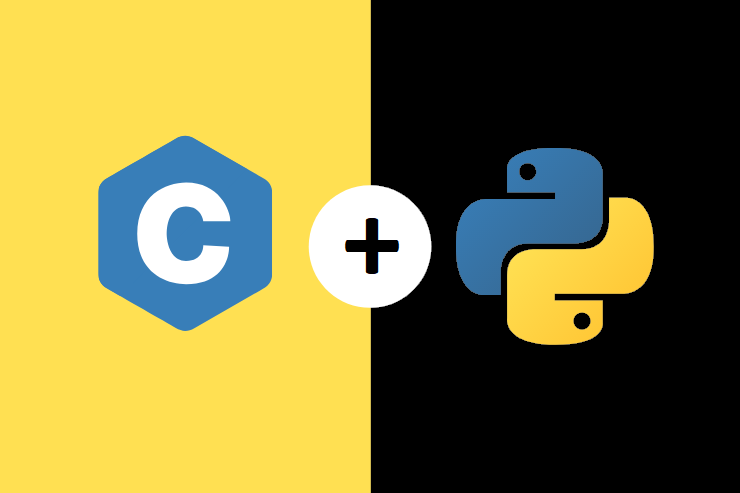
Importing C libraries and functions in Python using ctypes library and Cython
C is known by its speed, so sometimes when the performance and the speed are an issue, developers go to write complex functions or loops in C to get the benefits of a low-level language.
We will explore two ways to run C code from within Python. We will achieve that using two methods: ctypes library and Cython language which is a superset of python that compiles into C.
In part 1 of the post we will explore ctypes. While in part 2, we will do the task with Cython.
Read C Shared Libraries into Python with Ctypes
We will begin first with the ctypes library. Ctypes enables reading C shared libraries in python and using the predefined functions just any python functions.
The advantage of using ctypes is that it is simple. But on the other hand, it has some limitation especially when it comes to dynamic memory allocation e.g. malloc in C.
Let’s get started!
We have written a C function that perfoms range binary search and stored it into “binary_search.c” file
#include <stdio.h>
#include <stdlib.h>
void swap(int * x, int * y) {
int tmp = * x;
* x = * y;
* y = tmp;
}
void sorted(int * array, size_t len) {
int i, j, min_idx;
for (i = 0; i < len - 1; i++) {
min_idx = i;
for (j = i + 1; j < len; j++)
if (array[j] < array[min_idx])
min_idx = j;
swap( & array[min_idx], & array[i]);
}
}
void range_binary_search(int * array, int len, int val, int * res) {
int right = 0;
int left = 0;
int middle;
// not found
if (val < array[0] || val > array[len - 1]) {
right = 0;
left = -1;
}
// found
else {
while (right < len) {
middle = (right + len) / 2;
if (val < array[middle])
len = middle;
else
right = middle + 1;
}
len = right - 1;
while (left < len) {
middle = (left + len) / 2;
if (val > array[middle])
left = middle + 1;
else
len = middle;
}
}
res[0] = left;
res[1] = right - 1;
}
Then we have made our file a shared library
gcc -fPIC -shared -o libbsearch.so binary_search.c
N.B. The .so extension because I am on linux. In case of Windows it should be a .dll object.
Now, we would like to read this library into our python script and use normally the range_binary_search function.
In python, we will begin by defining a wrapper function to convert C functions from the library into python functions:
import ctypes
def wrap_function(lib, funcname, restype, argtypes):
"""Simplify wrapping ctypes functions
Thanks to this article:
https://dbader.org/blog/python-ctypes-tutorial-part-2"""
func = lib.__getattr__(funcname)
func.argtypes = argtypes
func.restype = restype
return func
Then we read the shared library
lib = ctypes.CDLL("./libbsearch.so")
Now, before starting anything, we define a function to convert a python list into a C array (Pointer to Int)
## To convert a full array
def to_cpointer(pyarr):
n = len(pyarr)
c_type = ctypes.c_int * n
c_arr = c_type(*pyarr)
return c_arr
## To initiate an empty C array
def empty_arr_init(size):
# cast the empty arr into a c_int
return (ctypes.c_int * size)()
Now we start importing the functions from the library using the wrapper function
c_sort = wrap_function(lib, "sorted", None,
(ctypes.POINTER(ctypes.c_int), ctypes.c_int))
bsearch = wrap_function(lib, "range_binary_search", None,
[ctypes.POINTER(ctypes.c_int), ctypes.c_int,
ctypes.c_int, ctypes.POINTER(ctypes.c_int)])
Look how we use ctypes.POINTER because the functions use values passed by reference.
Finally a wrapper function to print the results
def binary_search(arr, size, val, res):
bsearch(arr, size, val, res)
print("%s is at index %s till index %s" % (val, res[0], res[1]))
Now let’s test everything:
# random unsorted list arr = [4, 5, 5, 3, 2, 3, 7, 9, 10, 0, 11, 17, 25] n = ctypes.c_int(len(arr)) # convert python list to c array carr = to_cpointer(arr) # initialize an empty c array (2 because function returns range(left, right)) res = empty_arr_init(2) # Sort the array c_sort(carr, n)
Examples:
binary_search(carr, n, 2, res) # 2 is at index 1 till index 1 binary_search(carr, n, 3, res) # 3 is at index 2 till index 3 binary_search(carr, n, 17, res) # 17 is at index 11 till index 11 ## Not found binary_search(carr, n, 30, res) # 30 is at index -1 till index -1
Now we have a C function working well from within python.
Next, in part 2, we will look at how to read more complex C code in python using the Cython language.
Leave a Reply